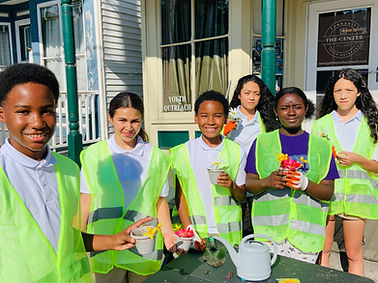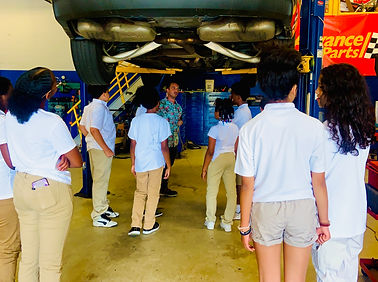
"BE THE PERSON YOU NEEDED GROWING UP"


YOUNG ENGINEERS
The Young Engineers Enrichment Program caters to students in grades 4th through 8th, providing an engaging and educational journey through agricultural, electrical, and computer science engineering. Over eight weeks, participants immerse themselves in hands-on learning experiences tailored to their grade level, fostering curiosity and passion for STEM fields.

Computer Engineering
The Computer Engineering component of Young Engineers will empower students with hands-on training in coding and software development, alongside immersive experiences in hardware design and troubleshooting. Additionally, students will embark on a captivating field trip to the Apple Store, providing them with an exciting firsthand glimpse into cutting-edge technology and innovation.
Electrical Engineering
Electrical engineering is a field that explores the study and application of electricity, electronics, and electromagnetism. In the Young Engineers Enrichment Program, students will dive into this exciting discipline through hands-on training. They'll learn to design and analyze circuits, identify electronic components, prototype circuits, troubleshoot electrical issues, and even get an introduction to programming microcontrollers. These practical experiences will deepen their understanding of electrical engineering concepts and equip them with valuable skills for future endeavors.


Agricultural Engineering
Agricultural engineering is a multidisciplinary field that applies principles of engineering, technology, and biological sciences to solve agricultural problems and improve farming practices. It involves designing, developing, and implementing various systems, machinery, and technologies to optimize agricultural production, enhance efficiency, and ensure sustainability.
When it comes to creating engaging lessons for youth in agricultural engineering, hands-on experiences are essential. By incorporating practical activities, experiments, and field trips, students can gain a deeper understanding of agricultural concepts and develop important skills.
Field trips to places like the Cranberry Bogs offer invaluable opportunities for hands-on learning. Students can observe real-world agricultural operations, interact with professionals in the field, and engage in activities such as:
-
Equipment Demonstrations: Agricultural engineers often design and develop specialized machinery and equipment for farming operations. Field trips provide students with the chance to see these technologies in action and learn about their functionality and importance in modern agriculture.
-
Environmental Monitoring: Cranberry bogs require careful management of water resources and environmental conditions. Students can learn about monitoring techniques used to assess water quality, prevent pollution, and maintain ecosystem health.
-
Problem-Solving Challenges: Field trips can incorporate interactive problem-solving activities, where students are presented with real-life agricultural challenges and are tasked with brainstorming solutions. This hands-on approach encourages critical thinking and creativity.
By integrating hands-on experiences into lessons and field trips, youth can develop a strong foundation in agricultural engineering principles while gaining practical skills that are essential for future careers in the field. These experiences also foster a deeper appreciation for the complexities of agriculture and the importance of sustainable practices.
Mechanical Engineering
Mechanical engineering focuses on the design, analysis, and manufacturing of mechanical systems and components. This can include anything from engines and machinery to heating and cooling systems. Students focusing on mechanical engineering will engage in a curriculum designed to provide them with a strong foundation in the principles of mechanics, materials science, and thermodynamics. They will learn to apply these principles to design, analyze, and optimize mechanical systems and components.

Music Engineering
Students had the chance to visit the Apple Store and learn how to use online instruments to create their own musical beats. Students created their own theme song for a favorite show, book, and game using GarageBand on iPad. Covering rhythm basics, and students experimented with drums, add prerecorded loops, and remixed their theme songs.

